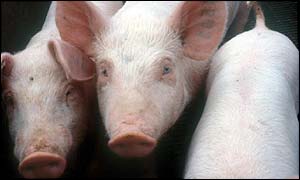|
Scientists Cross Pigs with Spinach
BBC News | Thursday, January 24th, 2002 
The GM pigs produced less fat than normal
Scientists in Japan say they have successfully implanted vegetable genes
in a living animal for the first time.
Researchers at Kinki University near Osaka inserted genetic material from spinach into a pig, which they say will produce healthier pork.
The experiment, which began several years ago, has yielded two generations of pigs with the spinach gene known as FAD2. Research team leader Akira Iritani said the pigs with the spinach gene had produced less fat than normal. "It is confirmed for the first time in the world that a plant gene is
functioning properly in a living mammal, not in a cultured cell," said
Professor Iritani. Safety issues
Photo Left: The experiment involved inserting the spinach gene into a fertilised pig egg. The experiment involved inserting the spinach gene into a fertilised pig egg, which was then implanted in a female pig's womb to produce genetically modified piglets. The FAD2 gene was found to convert about a fifth of the piglets' saturated fatty acids into healthier linoleic acids. Professor Iritani said he hoped to prove the genetically modified pork was safe to eat. "I know genetically modified food has met poor public acceptance, but I hope safety tests will be conducted to make people feel like eating [the GM pork] for the sake of their health," he said. Professor Iritani said only about 1% of GM piglets survived after being born, although breeding among GM pigs would ensure the spinach gene was passed on. |



